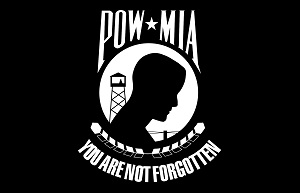
February 12, 1973
Forty-one years ago this week, prisoners of war held by the North Vietnamese were returned home as a result of the Paris Peace Accords. The mission, known as Operation Homecoming, returned 591 POWs back to the United States. Though these brave men were only a fraction of those listed as prisoners of war or missing in action, their survival brought the care of POW/MIA soldiers to the forefront of veterans issues.
American Soldiers Held for Years
During the Vietnam War, American intelligence agencies had a difficult time ascertaining how many soldiers had actually been captured by the Vietnamese. Estimates ranged from 500 to over 2,000, and exact numbers may never be known.
The most notorious of the POW camps, the Hoa L Prison, was sarcastically known as the Hanoi Hilton. Part of the prison specifically opened to house American POWs was called, Little Vegas, with building areas named after famous Vegas Strip landmarks. Most of the prisoners were Americans shot down during bombing raids.
Prisoners were universally tortured, sometimes with the goal of extracting information, but more often with the goal of breaking the Americans spirits. After hours of torture, POWs would be forced to write or record anti-American statements, denouncing the countrys role in the war. While the prisoners were initially able to withstand the torture, the vast majority broke after months and years of brutal interrogation methods.
While the prisoners may have given the Vietnamese some information, often it was not the information their captors actually sought. One POW recounted how when pressured to name the other members of his squadron, he gave his torturers the names of his high school football coaches.
Many POWs are still haunted by forced statements against the United States, even though they had done what was necessary to survive. After the physical wounds of torture healed, many Vietnam veterans are left with lasting psychological scars.
Troops Kept Humor, Good Spirits When Possible
While the torture and interrogation of American troops was brutal, hundreds of stories from released POWs show that the soldiers kept their good humor alive when possible. In addition to creating cheeky nicknames like the Hanoi Hilton, prisoners were able to communicate with each other by tapping out codes on the walls of the cells.
Marine Capt. Orson Swindle recounted one story of tricking his Vietnamese captors into celebrating the Marine Corps birthday. One interrogator taunted him by saying that the U.S., as a young country, could not have any meaningful holidays. He responded by claiming that November 10 was known throughout the country as National Doughnut Day, and was a major national holiday. The Vietnamese had occasionally created treats known as sticky buns for the prisoners to eatin reality, they were little more than pieces of old, fried bread with sugar. Regardless, the sticky buns were a break from the norm and a small kindness to the troops.
After he was released from his torture session, Capt. Swindle tapped out the story of National Doughnut Day through the walls of the prison, getting other captives to corroborate the account. When November 10th came around, the Vietnamese helped celebrate the Marine Corps birthday by bringing around sticky buns for the soldiers.
POWs Released, But Legacy Remains
The Paris Peace Accords, signed in January of 1973, negotiated the release of American prisoners of war and brought an end to the conflict in Vietnam.
On Jan. 27, 1973, there would be a ceasefire between North and South Vietnamese. Once the ceasefire was in effect, U.S. troops would withdraw and U.S. prisoners of war would be released.
A total of 591 prisoners were released from Vietnamese prisoner camps. Beginning on February 12, 1973, C-141 transport planes flew to Hanoi, Vietnam to evacuate the captured soldiers. The planes, known as Hanoi Taxis, could take 40 POWs at a time, and made 54 trips in total from February 12 to April 4. The first group of prisoners released had spent between 6 and 8 years as prisoners of war.
The North Vietnamese were never prosecuted for war crimes or for violating the Geneva Conventions rules against torture.
Today, the Hanoi Hilton has been demolished, and a war museum stands in its place. The National League of Families, created in 1967, still works to resolve the fates of missing soldiers from all wars, and was instrumental in bringing the treatment of POWs into the consciousness of the American public.
The indescribable brutality and terror experienced by prisoners of war in Vietnam remains an important part of the conversation about veterans rights and experiences. For more information about how to help POW/MIA soldiers, visit https://www.pow-miafamilies.org/





